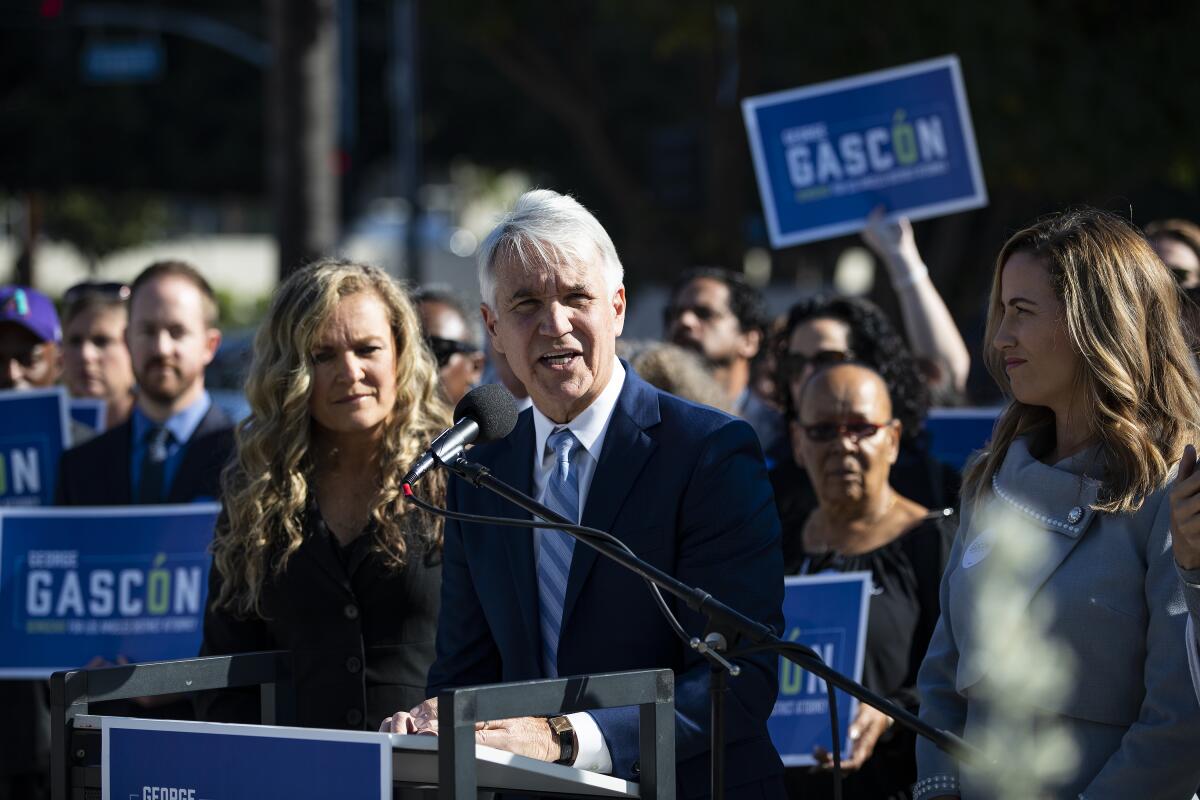Editorial: Gascon’s reform vision comes to the Supreme Court

- Share via
Elected prosecutors like L.A. County Dist. Atty. George Gascón must be able to set their own prosecution and sentencing policies, within the limits of the law, because there will never be enough court time or prison space for them to chase every possible criminal charge or seek the maximum allowable sentence in every case.
But there’s another reason the American system, built on the separation of powers and on the ultimate authority of the people, vests executive branch officials like district attorneys with broad discretion: They carry out the will of voters — again, within the limits of the law. And in Los Angeles County, voters chose Gascón and his plans for a criminal justice system that prosecutes in a manner that keeps communities safe without indulging in excessive punishments that lock people away for many decades more than necessary.
As is often the case with changes in administration and policy, Gascón’s plans did not sit well with many of the players who have used an older approach their entire careers, and that includes some trial court judges. One example is the judge presiding over the trial of Rehan Nazir, a defendant accused of kidnapping, extortion, carjacking, criminal threats and six counts of assault with a firearm. Conviction on those charges would land Nazir in prison for a very long time, and Gascón’s office has no problem with that. But Nazir was initially charged under the previous D.A., who also filed for “firearm enhancements” on top of the assault-with-firearm counts. If proven in court, the enhancements would result in many additional years in prison.
Gascón’s policy is to not pursue sentence enhancements in addition to the underlying charges, avoiding the imposition of gratuitous extra prison time beyond the base terms. That sort of policy — correcting sentencing excesses and allocating scarce resources like prison space — is a basic element of criminal justice reform and a good example of prosecutorial discretion, exercised wisely.
In accordance with Gascón’s policy, the courtroom prosecutor asked to dismiss the enhancements. But the judge refused, first on procedural grounds, and later on the argument that Gascón lacks power to exercise his discretion in such a fashion.
To its credit, the state Supreme Court has become interested in the question and has invited Gascón to weigh in. The correct move now would be for the justices to order the trial court to drop the enhancements and, in so doing, vindicate a district attorney’s power to decide what charges to file and what punishments to seek — and vindicate the right of the people to set the proper course for their criminal justice system.
The people, of course, have not always felt this way about crime and sentencing. For several decades, California voters called for longer sentences, and as a result, prosecutors were judged by how many defendants they put away and for how long, rather than on how appropriately the punishment fit the crime and the needs of public safety. In those days, it was judicial discretion that was under attack, because judges sometimes pushed back against prosecutorial excesses.
But in many cities across the nation, voters have called for a new, more constructive approach to criminal justice. That’s especially true in California and certainly in Los Angeles County, as evidenced by Gascón’s election last year. Many of Gascón’s deputies disliked their new boss’ policies and went to court to block him. They won a partial victory, at least for now. The judge in that civil case, like the judge in Nazir’s criminal case, balked at this basic exercise of prosecutorial discretion.
Meanwhile, a number of people in law enforcement and politics who have vested interests in the pre-reform status quo are trying to get voters to change their minds again. They’re attempting recall campaigns against Gascón and his counterpart in San Francisco. But unless and until they speak again, voters in L.A. County have spoken. They are with Gascón and reform.
When he was state attorney general, Xavier Becerra declined to weigh in on the Nazir case, which is a shame. New Atty. Gen. Rob Bonta, who is up for election next year, positions himself as a criminal justice reformer, and if that’s indeed true, he should back the power of prosecutors to charge, or not charge, as they deem appropriate.
It’s time for the state Supreme Court to say “no” to inappropriate meddling by judges in prosecutorial policy and decision-making. Just as it was wrong for judicial powers to be reallocated to prosecutors in the “tough on crime” era, it is wrong now for judges to usurp powers properly in the prosecutor’s ambit: what crimes to charge, and what punishments to seek.
More to Read
A cure for the common opinion
Get thought-provoking perspectives with our weekly newsletter.
You may occasionally receive promotional content from the Los Angeles Times.










